- Home
- Penny Jordan
Forbidden Kisses with the Boss Page 3
Forbidden Kisses with the Boss Read online
Page 3
He resented her and he feared—not her—but her intelligence, her calm air of authority, her sheer ability.
Confrontation was not Hannah’s way; she had tried it too often with her brothers as a child and lost. Nor did she intend to go behind his back and solicit the support of others. She preferred to handle the situation in her own way.
It had come as an unpleasant shock to realise what other members of her sex had to endure in the workplace. When she had said as much to one of the senior secretaries in an unguarded moment, the other girl had grimaced, and said, ‘You don’t know the half of it! Talk about pandering to the male ego… Some of them are sweeties and the worst you can say about them is that they haven’t bothered to keep up with the new technology and that they expect their secretaries to do their work for them, and to keep quiet about their contributions when the plaudits are being handed out. But that’s the best of them. The worst—’ She had rolled her eyes and added grimly, ‘I advise every junior secretary I train to make it plain right from the start where they stand when it comes to sexual harassment.’
‘But how?’ Hannah had asked, remembering how hard she had found it to get it through her boss’s arrogant conceit that she found his advances repulsive.
‘Oh, it’s not easy, but there are ways. No provocative clothing, no flirtatious or misinterpretable remarks, unless you know the guy on the receiving end is going to take them the right way. And if you do get someone who steps out of line…well, depending on how far out of line he is, there are one or two tricks of the trade to make him see the error of his ways. Spilling his coffee over him, dropping a couple of files where it’s going to hurt, mentioning his wife and saying you think your mother knows her.’
Even though she had laughed, Hannah had been appalled that such measures were necessary.
Now she waited as he studied the figures she had given him, his small mouth pursing meanly. He put down the papers and leaned across her desk, bracing his hands on the edge of it, a threatening sexual stance, which Hannah ignored.
‘Two days off this week. Another off on Monday. Got a boyfriend, have we?’
Hannah bristled mentally at the overt prurience in his voice, but didn’t lift her head from her work.
Her boss was balding and forty-odd, his body running to fat. He had a penchant for strong aftershaves which were unpleasant at close quarters. He was well-groomed, as one would expect of a man in his position, but Hannah reflected that it was more due to his wife than to him. The wife whom he openly boasted about keeping short of money at home…jocularly adding that it was the best place for women to be, while leering at the office junior as she whisked past in her fashionable short skirt.
Hannah detested him and all men like him, but she was wise enough to know that no amount of protesting would change his attitude.
She was glad when her telephone rang, making it unnecessary for her to answer his questions. At least it was Friday, and she had the whole weekend in which to prepare herself for Monday’s interview.
* * *
WHEN SHE WAS at home in her docklands apartment, Hannah dressed completely differently from the way she did for work. Jeans and sweatshirts were the order of the day, while she worked happily on decorating the apartment more in line with her own tastes than those of the builder.
She had opted for one of the more expensive apartments, with a generous balcony area and marvellous views of the Thames.
On Saturday morning, drawn outside by the sun, she ate her breakfast sitting by the balcony, lazily watching the world and his wife go by—most of them apparently driving bright scarlet Porsches, and wearing clothes from a very small and select group of designers.
‘Yuppies,’ the media designated them with fiendish joy, but to Hannah, who was part of them professionally and yet apart from them personally, they sometimes seemed to be a sad, uncertain group, huddled together clone-like for comfort, desperate to conform to their own rigidly set standards. But then she allowed fair-mindedly that any group must seem like that to those on the outside.
She rested her chin in her hands as she stared out across the Thames, busy with craft as people made the most of the sunshine.
She ate the rest of her croissant, bought from the small specialist baker who had opened in the elegant shopping arcade not far from her apartment, acknowledging that she was lucky in her tall slenderness in that she never had to worry about putting on extra pounds.
Her eldest brother Matt had called at the apartment just after she’d moved in. He had been making an overnight stop in London, en route for Alaska and the pipeline whose constructions he had been heavily involved in.
‘Very swish,’ he had approved, grinning at her, as he inspected the stark black and white décor and furniture. ‘Not much like home, though, is it?’
‘It isn’t meant to be,’ Hannah had told him sharply, not liking the hint of amusement she sensed beneath his admiration.
Was that why she had almost deliberately set out to soften the harsh lines of the apartment’s design, by bringing in rich textiles, silk damasks in scarlet and gold, India rugs that warmed the bare floorboards?
And in her bedroom she had given way fully to the imaginative side of her nature, the side she normally kept strictly under control, falling for and buying some French bedroom furniture in smooth, strong cherrywood.
The bed had high scrolled head and foot-boards that made her think rather fancifully, when she lay in it looking at the river, that she was lying in her own private barge, perhaps waiting for the tide to take her upriver to the heart of the city, or downriver and out to sea like an Elizabethan buccaneer.
The bed had a rich blue, silk damask quilted eiderdown and matching spread; the silk had cost a fortune and she had wondered if she was a little mad after she had committed herself to its purchase, but there was something about the sensation of the silk, about the richness of its colour, about the sheer luxury of the fabric, that was worth every penny she had spent.
Curled up in the Lloyd loom chair she had filched from her bedroom at home, she studied the fact sheets she had assembled.
The Jeffreys Group had been started as a single cell company almost fifteen years before by Silas Jeffreys, who had seen an opening selling financial services to his fellow ex-graduates as they found their way in the business world. He had advised them on their tax affairs, their pensions, their investments; his financial acumen was so keen that he had been retained by several small, successful companies to reorganise their financial departments, and so his own business had grown.
He was one of the few new-wave financiers who did not feel it necessary to operate from New York as well as London, although he had been approached by various American concerns as a consultant.
The share crisis which had stunned worldwide stockmarkets in 1987 had left him unscathed, which had added to his aura of mystique.
Hannah put the papers to one side and thought of the people she knew by repute who worked for his organisation, all of them with formidable reputations. Jeffreys Group never head-hunted staff—it never needed to. The prestige of working for it was such that Silas Jeffreys could choose his own workforce from among the best financial brains in the country.
Would she be eligible to join that number? She pressed her hand to her stomach to quell the unfamiliar sensation of butterflies fluttering there.
Until now she hadn’t admitted even to herself how important getting this job was. She had developed caution during her teens when she had discovered how much her enthusiasm for maths set her apart from her peers… Seeing how much they, especially her male peers, resented her success and her enthusiasm, she hadn’t allowed herself to want anything too much. She could vividly remember as a teenager the excitement of being invited out on a date and then finding that the boy concerned didn’t share her thirst for knowledge, her determination to use her talents to the full.
Was it then that she had started to teach herself to make a choice? To accept that, no matter what th
e media hyped, it wasn’t possible to ‘have it all?’
Among her acquaintances there were several couples with high-profile careers and marriages which seemed to thrive on busy schedules and frantic efforts to spend time together; they were happy and fulfilled, these energetic, busy couples who filled every moment of their lives, but Hannah wasn’t sure if she possessed the ability to match such diversification, whether she had it in herself to make a success of marriage and a career. The men she had known had demanded too much from her, making her back off from them, making her fear that they would try to woo her away from her career.
She would like to be one of the enviable few who had it all: a satisfying career, plus a partner with whom she could genuinely share the joys and disappointments of her life, who would genuinely accept her as his equal, who would understand her desire to be part of the busy, thriving world of finance. And yet someone who at the same time understood her nostalgic yearning for a home such as the home her parents had built: comfortable, welcoming…a home where muddy boots and muddy paws were equally welcome, a home where children thrived, a garden full of sunshine in summer and snow in winter, comfortable rooms full of old furniture. And it was this ambiguity within her that insisted she make choices, that insisted that for her a career and marriage could not go hand in hand.
It might be different if she had ever met a man who mattered…a man so essential to her life that he would be the very core of it, and yet instinctively she feared that dependence, that emotional needing.
She closed her eyes, impatient of the deeply romantic vein within her that she preferred to ignore, and was stunned by the immediacy with which her imagination recreated for her the features of a certain tax official.
So, he had an openly visual masculine face, a male aura that had been hard to ignore, a subtle awareness of himself that had been vaguely challenging, giving her the sensation that he was daring her to react to him.
He was probably married with half a dozen children, and a lover tucked away discreetly somewhere, she told herself cynically, banishing his image. It was her mother’s fault that she was suffering this mood of introspection…her loving, old-fashioned mother with her talk of weddings and babies, and her thinly veiled anxiety that she, her daughter, was never going to produce grandchildren for her to coo over and boast about.
She had four brothers, for heaven’s sake, Hannah thought pettishly. Let them produce grandchildren…
She had received several casual invitations from friends for events over the weekend, but she had turned them all down, wanting to concentrate on planning her interview strategy. Besides, there was a Beethoven concert on the radio on Sunday evening which she wanted to hear.
She went to bed early, wishing she could subdue the restless sensation of dissatisfaction which had invaded her. It was counter-productive and dangerous. There was no room for it in her life. Especially not now when she faced what was probably the most challenging interview of her career.
* * *
ON MONDAY morning she was up at her normal time. Her interview was at eleven o’clock, which left her plenty of time to get ready. She showered and washed her hair, blowdrying it into its smooth bob, and dressing carefully in a cool cream satin shirt and a new suit in navy with a chalk stripe, severely cut and formidably businesslike.
Navy tights, Jourdan pumps, her expensive navy leather briefcase. On her wrist, her discreet gold watch. The gold ear-rings the boys had bought her for Christmas in her ears. A light spray of the cool fresh perfume she favoured, just to let the interviewer know that, while she had no intentions of trading on her femininity, neither was she in the slightest ashamed of it.
She was lucky in the excellence of her skin, which required little make-up. She uncapped her new lipstick, a soft red, which the salesgirl had enthused over, but which, once she had it on, seemed to draw attention to her mouth in a way she was not sure she liked, even though there was nothing vibrant or striking about the colour. She hesitated to wipe it off, frowning a little and then deciding she was being over-critical, not seeing in her reflection what a man would notice straight away—and that was that the subtle gleam of the lipstick drew attention to the unexpectedly vulnerable fullness of her mouth, throwing it into challenging contrast with her businesslike appearance.
Just a mere brush of matt dark green eyeshadow to shape her eyes, and blusher to highlight her cheekbones, and then she was ready.
She hadn’t varnished her nails, which she kept short and well-buffed, and a small, fine gold ring which had belonged to a maternal great-aunt was her only piece of jewellery apart from her watch and ear-rings.
Before leaving, she stood on her balcony and took several calming deep breaths, concentrating all her mental energies within herself, gathering herself up for the ordeal ahead. And then she was ready.
She wasn’t driving her car, not having wanted to risk being unable to find a parking spot. The taxi she had ordered arrived on time, and she saw the driver give her an appreciative male look as she stepped into it. She ignored the look and crisply gave him his directions.
The Jeffreys Group had its offices, not in one of the high modern office blocks, but in a Georgian house in an elegant terrace of such houses set round one of London’s smaller squares.
The garden in the middle was lushly green, the trees throwing welcome shadows on to the footpath. The railings that guarded the square were painted black and tipped with gold; and as the taxi stopped alongside them to allow her to alight Hannah noticed a small gothic gazebo, almost hidden by the foilage, its walls painted green, only the pewter shimmer of its bell-shaped roof betraying its presence.
The garden had a padlocked gate, and inside someone was working, tirelessly weeding.
Although there was really no similarity between them whatsoever, for some reason the small garden made Hannah think of her home, and her mother, who loved the vicarage’s rambling, overgrown garden almost as much as though it was an extra child.
The square was full of parked cars: expensive, gleaming cars with German pedigrees, almost uniformly dark in colour, apart from the occasional thrusting scarlet of a new Porsche or Ferrari.
The car parked outside the Group’s front door was a Daimler, the same colour as the one she had noticed in the car park at home, Hannah recognised in passing.
The Georgian door was painted black and decorated with traditional brass knocker and handle. Above it, the delicacy of the Adam fanlight caught Hannah’s eye, and she hesitated, uncertain as to whether to knock or simply walk in. As she waited, the door opened and she realised that someone must be watching her. The thought made her feel slightly uncomfortable. She stepped into the cool darkness of the tiled hallway and found a smiling receptionist waiting to greet her.
‘Hannah Maitland?’ she questioned, and when Hannah nodded, she said pleasantly, ‘If you would just like to wait in the library. It’s down the corridor, first door on your right. You’re a few minutes early for your appointment. Would you like a cup of tea or coffee while you’re waiting?’
Hannah shook her head. She was too nervous to need any added stimulation.
Thanking the receptionist, she followed her directions and found that the library was exactly that: a welcoming, faintly musty room with leather chairs and mahogany bookshelves, stacked with leather-bound volumes. The carpet on the floor was Persian and beautifully faded. The original Adam fireplace had been retained, and even though Hannah suspected that the discreetly mellowed panelling along one wall probably concealed all manner of up-to-date computer and visual study equipment, it did not detract from the ambience of the room at all.
It was a room that spoke of comfort and mellowness…of a need to respect the proper order of things…of tradition and timelessness. It was a room that relaxed and reassured, she recognised sensitively.
She wasn’t being interviewed by Silas Jeffreys himself, but by his deputy, which led her to suspect that this was just a weeding-out series of interviews.
She
glanced surreptitiously at her watch. Three minutes to go. Her heart leapt as the door opened and then it leapt again, as she recognised the man who walked in, although for a far different reason.
To say that she was staggered to come face to face with the senior of the two tax officials from her county town, here of all places, was to grossly underestimate her feelings.
Her mouth dropped open as she stared at him in disbelief, her shock heightened by an odd feeling of fear and resentment. What was he doing here?
And then she knew. He was another contender for the job and a formidable opponent to her own chances, so her instincts told her.
He smiled at her as though coming face to face with her was an everyday occurrence, and once again she felt off balance and unnerved by his own very evident lack of reaction.
‘What do you think?’ he asked her pleasantly, and it took her several seconds to realise he was asking her opinion of their surroundings.
‘It’s…it’s very cleverly designed,’ she managed snappishly when she had recovered her composure. ‘Relaxing and reassuring. Clients coming in here would immediately feel reassured about the probity of the Group.’
He shot her a thoughtful look. Hannah would almost have described it as an assessing look, were it not for the fact that the mere thought of him daring to assess her made her stiffen with rejection and irritation.
‘You’ll be going in for your interview in a moment.’ He made the comment a statement rather than a question, and that added fuel to the fire of her resentment. ‘What is it that appeals most to you about this position?’ he questioned.
Hannah only just managed to stifle her gasp of fury.
‘I think that’s for the interviewer to ask and not you,’ she told him pointedly, and then couldn’t resist adding with a small grimace, ‘I suppose there’s no need to ask what you’re doing here? Although surely,’ she added with what she knew to be a touch of malice, ‘it’s rather dangerous for a man of your age to make such a major career move.’

 Woman To Wed?
Woman To Wed? Wanting
Wanting The Trusting Game (Presents Plus)
The Trusting Game (Presents Plus)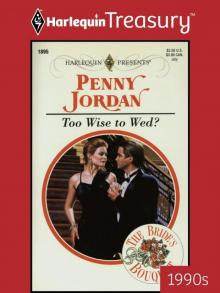 Too Wise To Wed?
Too Wise To Wed? Time for Trust
Time for Trust Out 0f The Night (HQR Presents)
Out 0f The Night (HQR Presents) Dangerous Interloper (Lessons Learned II Book 8; HQR Presents Classic)
Dangerous Interloper (Lessons Learned II Book 8; HQR Presents Classic) Best Man To Wed?
Best Man To Wed? They're Wed Again
They're Wed Again Out of the Night
Out of the Night An Innocent's Surrender
An Innocent's Surrender Marriage: To Claim His Twins
Marriage: To Claim His Twins Deal With the Devil--3 Book Box Set
Deal With the Devil--3 Book Box Set Matter of Trust
Matter of Trust Vacation with a Commanding Stranger
Vacation with a Commanding Stranger A Savage Adoration
A Savage Adoration The Mistress Purchase
The Mistress Purchase Reclaimed by the Ruthless Tycoon
Reclaimed by the Ruthless Tycoon The Tycoon's Forbidden Temptation
The Tycoon's Forbidden Temptation Sinful Nights: The Six-Month MarriageInjured InnocentLoving
Sinful Nights: The Six-Month MarriageInjured InnocentLoving Bedding His Virgin Mistress
Bedding His Virgin Mistress Escape from Desire
Escape from Desire Claiming His Shock Heir
Claiming His Shock Heir Stronger than Yearning
Stronger than Yearning Return of the Forbidden Tycoon
Return of the Forbidden Tycoon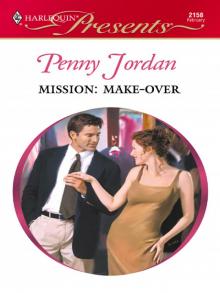 Mission: Make-Over
Mission: Make-Over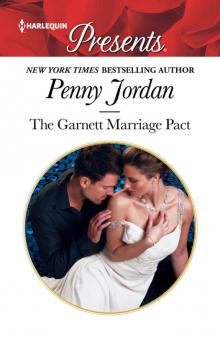 The Garnett Marriage Pact
The Garnett Marriage Pact Wanting His Child
Wanting His Child A Little Seduction Omnibus
A Little Seduction Omnibus The City-Girl Bride
The City-Girl Bride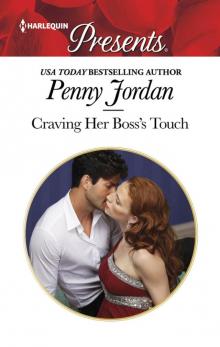 Craving Her Boss's Touch
Craving Her Boss's Touch Starting Over
Starting Over Phantom Marriage
Phantom Marriage The Italian Duke's Virgin Mistress
The Italian Duke's Virgin Mistress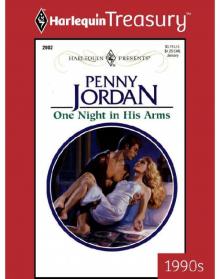 One Night in His Arms
One Night in His Arms Force of Feeling
Force of Feeling Forbidden Loving
Forbidden Loving For Better for Worse
For Better for Worse Silver
Silver Rival Attractions & Innocent Secretary...Accidentally Pregnant
Rival Attractions & Innocent Secretary...Accidentally Pregnant A Bride for His Majesty s Pleasure
A Bride for His Majesty s Pleasure Desire's Captive
Desire's Captive Forgotten Passion
Forgotten Passion Taken Over
Taken Over Taken by the Sheikh
Taken by the Sheikh Sicilian Nights Omnibus
Sicilian Nights Omnibus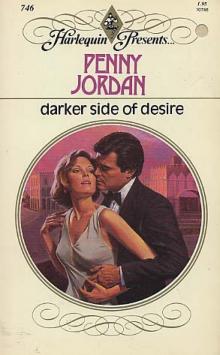 Darker Side Of Desire
Darker Side Of Desire A Royal Bride at the Sheikh s Command
A Royal Bride at the Sheikh s Command The Ultimate Surrender
The Ultimate Surrender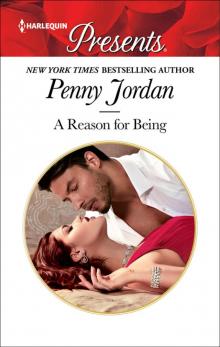 A Reason for Being
A Reason for Being A Cure for Love
A Cure for Love Bought with His Name & the Sicilian's Bought Bride
Bought with His Name & the Sicilian's Bought Bride Marriage Make-Up & an Heir to Bind Them
Marriage Make-Up & an Heir to Bind Them Bitter Betrayal
Bitter Betrayal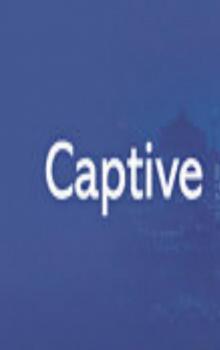 Captive At The Sicilian Billionaire’s Command
Captive At The Sicilian Billionaire’s Command Valentine's Night
Valentine's Night The Convenient Lorimer Wife
The Convenient Lorimer Wife Reawakened by His Touch
Reawakened by His Touch Substitute Lover
Substitute Lover Passionate Protection
Passionate Protection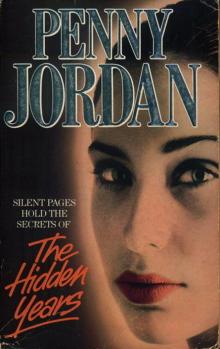 The Hidden Years
The Hidden Years So Close and No Closer
So Close and No Closer Passion and the Prince
Passion and the Prince Virgin for the Billionaire's Taking
Virgin for the Billionaire's Taking Cruel Legacy
Cruel Legacy Payment in Love
Payment in Love The Wealthy Greek's Contract Wife
The Wealthy Greek's Contract Wife Penny Jordan Collection: Just One Night
Penny Jordan Collection: Just One Night Permission to Love
Permission to Love Beyond Compare
Beyond Compare When the Magnate Meets His Match
When the Magnate Meets His Match A Time to Dream
A Time to Dream Christmas Nights
Christmas Nights Christmas with Her Billionaire Boss
Christmas with Her Billionaire Boss The Sheikh's Baby Omnibus
The Sheikh's Baby Omnibus The Tycoon's Virgin
The Tycoon's Virgin Falcon's Prey
Falcon's Prey Mistress Of Convenience
Mistress Of Convenience The Perfect Father
The Perfect Father Stranger from the Past & Proof of Their Sin
Stranger from the Past & Proof of Their Sin A Little Revenge Omnibus
A Little Revenge Omnibus Loving
Loving Lesson to Learn
Lesson to Learn Second Chance with the Millionaire
Second Chance with the Millionaire Payment Due
Payment Due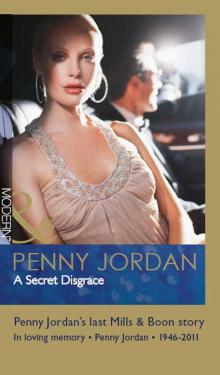 A Secret Disgrace
A Secret Disgrace Conveniently His Omnibus
Conveniently His Omnibus An Unforgettable Man
An Unforgettable Man The Tycoon She Shouldn't Crave
The Tycoon She Shouldn't Crave Pride & Consequence Omnibus
Pride & Consequence Omnibus The Dutiful Wife
The Dutiful Wife Bought With His Name
Bought With His Name The Friendship Barrier
The Friendship Barrier High Society
High Society The Price of Royal Duty
The Price of Royal Duty A Scandalous Inheritance
A Scandalous Inheritance At His Convenience Bundle
At His Convenience Bundle The Blackmail Baby
The Blackmail Baby Prince of the Desert
Prince of the Desert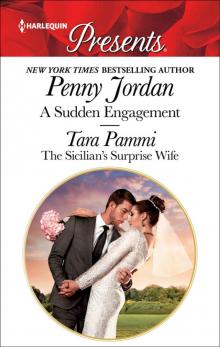 A Sudden Engagement & the Sicilian's Surprise Wife
A Sudden Engagement & the Sicilian's Surprise Wife Unexpected Pleasures
Unexpected Pleasures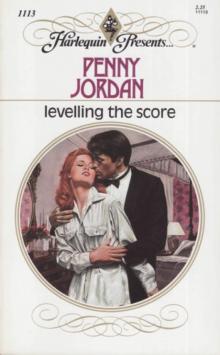 Levelling the Score
Levelling the Score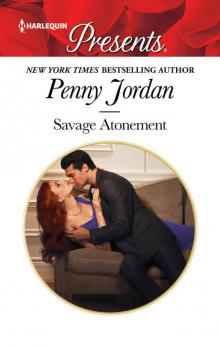 Savage Atonement
Savage Atonement Dangerous Interloper
Dangerous Interloper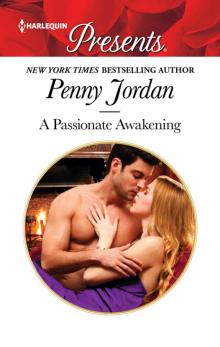 A Passionate Awakening
A Passionate Awakening Ruthless Passion
Ruthless Passion Time Fuse
Time Fuse Past Passion
Past Passion Her One and Only
Her One and Only The Innocent's Secret Temptation
The Innocent's Secret Temptation A Stormy Spanish Summer
A Stormy Spanish Summer The Marriage Demand
The Marriage Demand Future King's Pregnant Mistress
Future King's Pregnant Mistress Unwanted Wedding
Unwanted Wedding Giselle's Choice
Giselle's Choice Now or Never
Now or Never Blackmailed by the Vengeful Tycoon
Blackmailed by the Vengeful Tycoon Lovers Touch
Lovers Touch Scandalous Seductions
Scandalous Seductions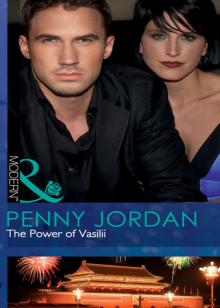 The Power of Vasilii
The Power of Vasilii Possessed by the Sheikh
Possessed by the Sheikh It Happened At Christmas (Anthology)
It Happened At Christmas (Anthology) The Perfect Lover
The Perfect Lover The Flawed Marriage
The Flawed Marriage The Greek's Runaway Bride
The Greek's Runaway Bride An Unbroken Marriage
An Unbroken Marriage Hired by the Playboy
Hired by the Playboy The Blackmail Marriage
The Blackmail Marriage Daughter of Hassan
Daughter of Hassan Campaign For Loving
Campaign For Loving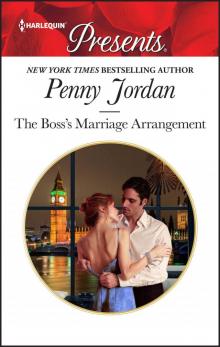 The Boss's Marriage Arrangement
The Boss's Marriage Arrangement Seduced by the Powerful Boss
Seduced by the Powerful Boss Marriage Without Love & More Than a Convenient Marriage?
Marriage Without Love & More Than a Convenient Marriage?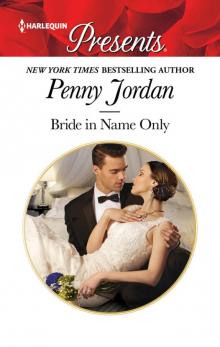 Bride in Name Only
Bride in Name Only Her Shock Pregnancy Secret
Her Shock Pregnancy Secret Propositioned in Paradise
Propositioned in Paradise The Only One
The Only One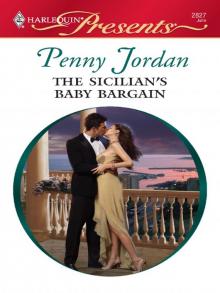 The Sicilian s Baby Bargain
The Sicilian s Baby Bargain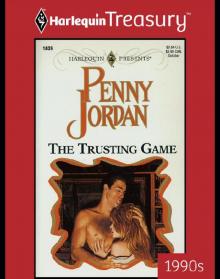 The Trusting Game
The Trusting Game The Most Coveted Prize
The Most Coveted Prize One-Click Buy: September Harlequin Presents
One-Click Buy: September Harlequin Presents In Her Enemy's Bed
In Her Enemy's Bed An Expert Teacher
An Expert Teacher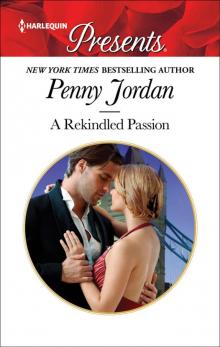 A Rekindled Passion
A Rekindled Passion The Reluctant Surrender
The Reluctant Surrender Shadow Marriage
Shadow Marriage A Scandalous Innocent
A Scandalous Innocent Forbidden Kisses with the Boss
Forbidden Kisses with the Boss Bound Together by a Baby
Bound Together by a Baby Second-Best Husband
Second-Best Husband Response
Response His Untouched Bride
His Untouched Bride A Kind of Madness
A Kind of Madness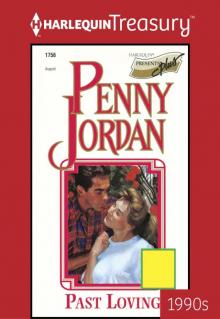 Past Loving
Past Loving His Blackmail Marriage Bargain
His Blackmail Marriage Bargain For One Night
For One Night Legally His Omnibus
Legally His Omnibus Back in the Marriage Bed
Back in the Marriage Bed Man-Hater
Man-Hater